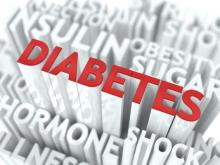Many patients with type 2 diabetes have “material need insecurities” – trouble paying for food, medications, housing, or utilities – which greatly impact control of the disease and their use of health care resources, according to a report published online Dec. 29 in JAMA Internal Medicine.
If these pressing but nonmedical needs aren’t identified and addressed, increasing access to health care and diabetes treatments will likely be futile, said Dr. Seth A. Berkowitz of Massachusetts General Hospital and Harvard Medical School, Boston, and his associates.
Most previous research into such material needs have focused on a single need in isolation. In their study, Dr. Berkowitz and his colleagues assessed several material needs simultaneously, to obtain a more accurate picture of the real-world experience of diabetes patients at the lower end of the socioeconomic scale. They surveyed 411 patients attending two community health centers, an academic internal medicine practice, or a diabetes specialty clinic in the Boston area during a 1-year period. The mean patient age was 62 years; 48% were women, and 79% were of non-Hispanic white ethnicity. Health insurance coverage was very high, since Massachusetts has near-universal coverage; only 4% of the study participants were uninsured or self-pay clients, and less than 35 lacked coverage of prescription medication.
Eighty respondents reported having a limited or uncertain availability of food due to its cost. This likely included many who relied on cheap, calorie-dense, highly processed foods because of the inaccessibility of healthier alternatives recommended for glycemic control. A total of 104 respondents reported that they underused medications because of costs; 44 reported housing instability, including homelessness, evictions, frequent moves, or residing with friends or relatives to share living expenses; and 72 reported that they couldn’t consistently afford household heating or cooling.
Diabetes patients who had food, medication, housing, or utility insecurities were significantly more likely than others to have poor diabetes control, poor lipid profiles, poor control of hypertension, and to require more outpatient and emergency department/inpatient visits. Moreover, every additional material need insecurity raised the odds of poor diabetes control by 39%, the odds of outpatient visits by 9%, and the odds of emergency department/inpatient visits by 22%, Dr. Berkowitz and his associates said (JAMA Intern. Med. 2014 Dec. 29 [doi:10.1001/jamainternmed.2014.6888]). These findings indicate that to achieve diabetes control, many patients need not just standard medications but comprehensive interventions that also address access to food, medication, and stable housing. Programs that link patients to government and community resources would be beneficial, as would direct supplementation of healthy foods and “bundling” of low-cost (generic) medications such as metformin, statins, and ACE inhibitors, the investigators said.
This study was supported by the Institutional National Research Service, the Ryoichi Sasakawa Fellowship Fund, the division of general internal medicine at Massachusetts General Hospital, and the National Institutes of Health. Dr. Berkowitz and his associates reported having no relevant financial conflicts of interest.


